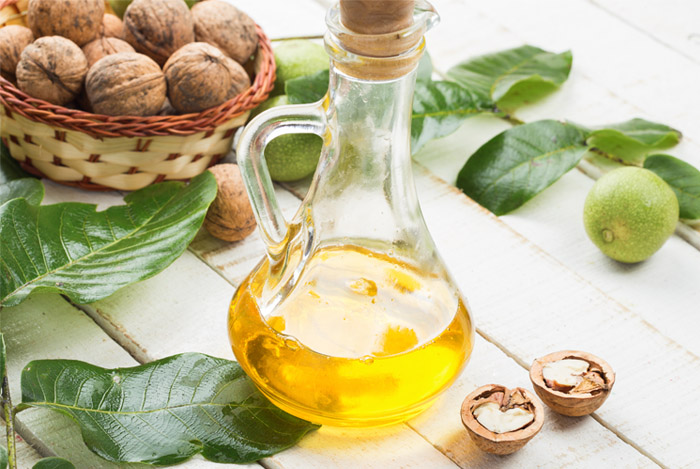Have you ever wondered about the oils you use to prepare meals?
It really does seem to be an afterthought for a lot of people. The only time much scrutiny goes into the type of cooking oil you purchase is when a recipe calls for a different variety.
But what about the health concerns regarding these oils? Are some people really cutting oil completely out of their diets? Why? What about the existing diets that proudly feature some of these oils?
I dug up all the information I could on exactly what these oils are doing in our bodies and what might happen if we were to cut them out entirely.
Let’s get to it then, shall we?
What Are Oils?
 Oils are types of fats that are in liquid form at room temperature. To put it more technically, these oils are mixtures of fatty acids that have been esterified to glycerol. They’re triglycerides, which eventually end up in the blood.
Oils are types of fats that are in liquid form at room temperature. To put it more technically, these oils are mixtures of fatty acids that have been esterified to glycerol. They’re triglycerides, which eventually end up in the blood.
Oils are made of either animal or plant fat and are used in food preparation. While they aren’t their own food group, they do include certain nutrients the body uses.
Each oil – and believe me, there are lots of them – is created in a lot of different ways. Some of them have various subtypes, like olive oil coming in virgin and extra virgin – based on the different ways they are pressed to extract the oil from the olives.
The big issue here is the fat content of oils. Because fats are so prevalent across different foods, and can be made synthetically, there are all kinds of ongoing discussions about each and every one of them.
On Fats
 I’ve discussed fats at length in other posts, but I’m going to go over some of the facts again for our purposes today.
I’ve discussed fats at length in other posts, but I’m going to go over some of the facts again for our purposes today.
What people are most concerned about when it comes to fats is cholesterol. There has been a long held belief that dietary fat raises the concentration of cholesterol in the blood. And because higher cholesterol counts are linked to cardiovascular issues and stroke, it’s always been recommended we avoid fat.
This is not entirely true. New evidence shows that carbohydrates and sugar have a larger contribution to heart disease than fat.
But like anything, when it comes to fats, what counts is quality and quantity. The body needs all types fats for different functions in the body, and because you can only get some of them through consuming foods that contain those fats, you can’t simply exclude all fats from your diet.
Unsaturated fats are considered better for you.
These come in two forms:
- Monounsaturated: found in olive, sesame, canola, avocado oils, as well as in nuts and their oils.
- Polyunsaturated: found in corn, safflower, sunflower, flaxseed, soybean, and cottonseed oils.
Saturated fats are considered bad for you and tend to be higher in calories as well.
Saturated fats are found in:
- Oils: palm, palm kernel, coconut oils
- Meat: beef, lamb, pork, poultry
- Dairy: butter, cheese, whole and reduced-fat milk, lard, cream
- Baked goods
- Fried foods
Trans fats are the really harmful fats. They aren’t essential for your health, and they do nothing to promote better health. Consuming trans fats increases your risk of heart disease because they raise “bad” low-density lipoprotein (LDL) cholesterol and lower your “good” high-density lipoprotein (HDL) cholesterol.
Trans fats are found much more in partially hydrogenated oils than they are in the more naturally occurring oils. And trans fats tend to hang out with lots of processed and packaged foods – a large part of what makes them so unhealthy.
Most cooking oils tend to contain all types fats. For example, although olive oil is a monounsaturated fat, it does contain saturated and polyunsaturated fat too, just in lesser amounts. Like I pointed out, we need all types of fats in the body, so it really comes down to eating the most natural forms of fat and not over consuming them.
But, instead of weighing which oils are better for you, people advocating for the elimination of oil altogether are pretty passionate about the subject. What do they have to say?
The Claims
 The discussions of the effects oils have on the body are, to be honest, somewhat confusing.
The discussions of the effects oils have on the body are, to be honest, somewhat confusing.
The starting point usually seems to be that they aren’t “natural”. The human body did not evolve eating these oils, that’s for sure. A lot of the fats were present in our diets, but not the super-processed versions found in oils. We started producing these oils about a hundred years ago.
Though simply because something isn’t deemed “natural” does not necessarily make it a bad thing. Cures for illnesses and modern medications aren’t “natural”, but we sure use a lot of them.
But a lot of people want oils eliminated altogether. For example, it is often claimed that canola oil is toxic, causing various diseases. But there has never been any scientific research done suggesting any link between canola oil and diseases.
Vegan athlete, podcaster, and blogger Matt Frazier eliminated oil from his and his wife’s diet altogether over time, citing the high caloric density of oils. He hasn’t lost weight on the oil-free diet, but because of he is a marathon enthusiast, he doesn’t want to. He reports his wife has lost 18 pounds.
Unfortunately, those results aren’t very scientific and can’t really be tested.
It really all comes down to the actual evidence of how these oils treat the body.
How the Body Reacts to Oils: The Evidence
 Now for more of the hard science.
Now for more of the hard science.
In an article from June 7, 2013, Science Daily reported that vegetable oil with high amounts of omega-6 fatty acids is actually good for you. They claimed that the omega-6 in question, linoleic acid, was an essential nutrient in lowering the risk of heart disease.
Researchers from the University of Missouri and the University of Illinois found no existing link between vegetable oil consumption and inflammation associated with heart disease, asthma, cancer, and arthritis. The researchers also reviewed 15 clinical studies about the effects of various forms of fats and found no link between them and inflammation.
Later that same year, another Science Daily article contradicted that one.
Researchers wrote, “Careful evaluation of recent evidence, however, suggests that allowing a health claim for vegetable oils rich in omega-6 linoleic acid but relatively poor in omega-3 linolenic acid may not be warranted”.
They found in reviewing a study from February of 2013 that “rates of death from all causes of cardiovascular disease and coronary artery disease significantly increased in the treatment group”.
Omega-6 fatty acids have certainly been linked to cancers and cardiovascular disease, but those researchers also concluded: “Consumption of saturated, monounsaturated or polyunsaturated fat overall was unrelated to risk”. Higher omega-6 is bad, but because you eat more fats containing it has no correlation to poor health.
So, what about the government institutes that issue guidelines for public health?
The US National Heart, Lung and Blood Institute has recommended that saturated fats be replaced by polyunsaturated and monounsaturated fats. They listed sunflower and soybean oils as good sources of polyunsaturated fats, and canola and olive oils as the healthier option for monounsaturated fats.
But if the science keeps going the way it has been, I half expect them to change their tune within a year or two of new research and data.
Vegetable oils like canola and soybean oils have been found to contain some trans fats. That’s a little worrying.
Luckily, when it comes to trans fats, the FDA ordered in June of 2015 that food manufacturers stop using it completely within 3 years. So those partially hydrogenated oils will be phased out, but that still leaves the saturated and unsaturated fats that are found much more often in oils.
Okay. So, the evidence isn’t really conclusive. The most recent studies indicate we shouldn’t be as worried, but who knows how much the science will eventually change?
Healthier Oils
 The oils that could be considered the healthiest for you (if you can’t conceivably exclude them from your diet) contain the best fats.
The oils that could be considered the healthiest for you (if you can’t conceivably exclude them from your diet) contain the best fats.
You want omega-3 fatty acids, monounsaturated, and polyunsaturated fats.
Grapeseed oil is high in polyunsaturated fats as well as vitamin E, and because of its high smoke point, it’s better than olive or vegetable oil when you’re stir frying or sautéing a meal.
Avocado oil is great when used to add flavor to fish or when mixed into a vinaigrette. It’s more expensive than other oils though, so keep it fresh if you want to benefit from its monounsaturated fats.
Walnut oil has a much lower smoke point than other oils, but works really well in salad dressings or for other foods as flavoring. It contains polyunsaturated fats and vitamin K.
Keep in mind, however, that the benefits outside of the monounsaturated and polyunsaturated fats are very low. The counts of vitamins and nutrients in these oils are very low, and the benefits are usually linked more closely to the foods their derived from.
The best way to be cautious with your oils is to look at the mixture of omega-6 and omega-3 fatty acids. According to a study published on Pub Med, there are several sources of information that tell us humans evolved eating a ratio of 1:1 omega-6 to omega-3. But in Western diets today, that ratio is more like 15:1 to 16.7:1.
Without a doubt, if you’re still going to use them, it wouldn’t hurt to seek out these healthier, more balanced oils.
Should You Eliminate Oil?
 At the beginning, we began with the question: What would happen to your body if you eliminated oils?
At the beginning, we began with the question: What would happen to your body if you eliminated oils?
The only sure, proven-by-research answer is that you would be taking in fewer calories, which is a good thing. But simply limiting your intake of these oils to fewer times a day/week could be just as effective in the long run.
This really isn’t as cut and dry as it should be. Maybe in a decade or two, once more serious scientific research has been performed on the consumption of these oils, we’ll know exactly what they do to the body.
We need to have definitive answers on which of the fats are truly bad for you – like we know about trans fats today. Until then, it’s hard to give any absolute, confident answers as to whether you should stop using them completely.
It’s also incredibly hard to continue eating regularly while excluding cooking oils from your diet unless you’re already a vegan or vegetarian. And even then, you’ll be changing the ways you cook and prepare your foods without there being a moral component to that decision.
A lot of these more nuanced conversations about foods come down to the actual level of consumption. At this point, I’m not sure how many times I’ve said it, but I’ll say it again: everything in moderation.
Yes, these oils are “unnatural” and are super calorie dense. But you aren’t exactly using vegetable oil as a replacement for milk in your cereal bowl, are you?
If you genuinely feel like the science will finally catch up and realize that we’ve been doing unimaginable harm to our bodies because of these oils, by all means, control your own diet. I would never criticize someone for taking their health into their own hands based on their convictions.
And if you don’t want to take a hard stance one way or another until the science is there to back up your decision, I won’t blame you for your skepticism.
What’s your take on these oils? Will you continue using them? Let me know in the comments below.
The post What Happens to Your Body When You Eliminate Oil appeared first on Nutrition Secrets.
http://www.nutritionsecrets.com/what-happens-body-eliminate-oil/
No comments:
Post a Comment